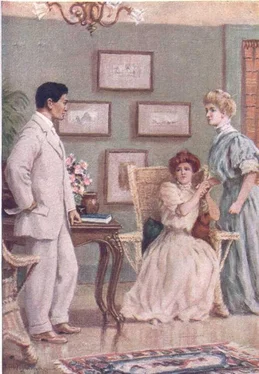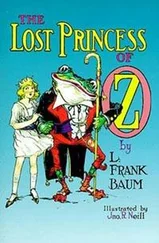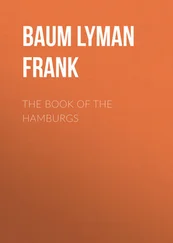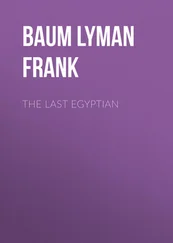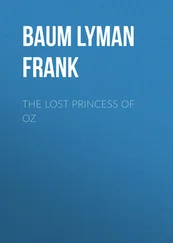L. Baum - The Last Egyptian
Здесь есть возможность читать онлайн «L. Baum - The Last Egyptian» весь текст электронной книги совершенно бесплатно (целиком полную версию без сокращений). В некоторых случаях можно слушать аудио, скачать через торрент в формате fb2 и присутствует краткое содержание. Год выпуска: 2019, Издательство: epubBooks Classics, Жанр: Прочие приключения, на английском языке. Описание произведения, (предисловие) а так же отзывы посетителей доступны на портале библиотеки ЛибКат.
- Название:The Last Egyptian
- Автор:
- Издательство:epubBooks Classics
- Жанр:
- Год:2019
- ISBN:нет данных
- Рейтинг книги:4 / 5. Голосов: 1
-
Избранное:Добавить в избранное
- Отзывы:
-
Ваша оценка:
- 80
- 1
- 2
- 3
- 4
- 5
The Last Egyptian: краткое содержание, описание и аннотация
Предлагаем к чтению аннотацию, описание, краткое содержание или предисловие (зависит от того, что написал сам автор книги «The Last Egyptian»). Если вы не нашли необходимую информацию о книге — напишите в комментариях, мы постараемся отыскать её.
The Last Egyptian — читать онлайн бесплатно полную книгу (весь текст) целиком
Ниже представлен текст книги, разбитый по страницам. Система сохранения места последней прочитанной страницы, позволяет с удобством читать онлайн бесплатно книгу «The Last Egyptian», без необходимости каждый раз заново искать на чём Вы остановились. Поставьте закладку, и сможете в любой момент перейти на страницу, на которой закончили чтение.
Интервал:
Закладка:
He ate the loaf and drank the milk, feeling much refreshed. Then he carried the sack to his dwelling and placed the papyrus rolls in it.
From the secret cavity beside the arch he took the bronze vase with the metal stopper, a scarab ring that his grandmother had sometimes worn, and a slender dagger with a steel blade. The bronze dagger that served as a key to the rock door he left in the cavity, as well as the lamp.
Having replaced the stone, he glanced around to see whether there was anything that might be disturbed or stolen during his absence; but the room was bare of anything to tempt a thief or a despoiler. So he swung the sack over his shoulder and walked out and around the end of the mountain on his way to the Nile.
Winston Bey had kept his word. On the chance that the strange Egyptian he had encountered would manage to secure either valuable information or some ancient relics from his mysterious grandmother, he had kept his dahabeah in the neighborhood, ignoring the protests of his unhappy Arab crew. The afternoon following his interview with Kāra, he landed near the group of palms an hour before sunset, and waited until darkness fell without obtaining a sight of the Egyptian. Then he dropped down the stream to Tel El Armana, where the dahabeah remained until the next noon.
To–day he figured on another disappointment; but when Gerald Winston had an object in view he pursued it with dogged determination, and he had resolved to keep his appointment each day for a week at least before considering his future actions. There was no question but he was on the track of an important discovery, and he did not intend to abandon the quest lightly.
On this second day, therefore, when he approached the grove and saw a white–robed figure sitting in the shade, his heart gave a joyful bound. He hurried forward and recognized Kāra, who remained motionless until the Englishman had saluted him. Then he bowed his head gravely.
Winston’s eyes were on the sack that rested beside the Egyptian, and his voice sounded eager in spite of his effort to restrain it.
“Well, my brother?” he exclaimed.
“My grandmother, Hatatcha, is dead,” said Kāra.
The Englishman shrank back in horror.
“You have killed her?”
“Oh, no; not at all,” answered the other composedly. “She was dying when I returned home after my conversation with you. It would not pay me to kill Hatatcha, you know.”
“What did you learn from her?”
“Nothing. She was beyond questioning. But she whispered that I should seek under the rushes of her bed for my inheritance, and then Anubis took her to his kingdom. Her secret, if she had one, she carried with her.”
Winston was deeply chagrined. He reproached himself for not having interviewed the old woman in person and endeavored to wrest her secret from her. Now, alas, it was too late!
“What have you in the sack?” he inquired, almost indifferently.
“My inheritance,” said Kāra.
“Of what does it consist?”
“I have fourteen rolls of ancient papyrus manuscript.”
“Fourteen rolls?” cried Winston, trembling with sudden excitement. “Let me see them, man—let me see them!”
Kāra did not move.
“I am going to Cairo,” said he. “Will you take me with you in your boat?”
“Yes; to be sure. Come to the boat at once.”
“That is better,” declared the Egyptian. “You can then examine the papyri at your leisure and determine whether they are of interest to you.”
He slowly arose to his feet and swung the sack across his shoulder. Winston eagerly preceded him. The stifling heat was all forgotten. Hatatcha’s unfortunate death was forgotten. A treasure had been unearthed at last, and surely from fourteen manuscripts much important information might be gleaned.
On the deck of his dahabeah he glanced at the papyri with amazement. Each one was perfectly preserved and unrolled without danger of breaking.
“Their condition is extraordinary!” he observed. “Where, did you say, you found them?”
“In a hollow of earth, covered by the rushes of Hatatcha’s couch.”
Winston raised his head to look at the speaker closely.
“Then they have not been there long, I am sure.”
“That,” said Kāra, with a shrug, “is a matter of which I have no knowledge.”
The scientist carefully unrolled a manuscript.
“This,” he said, musingly, “is a poem by the poet Pen–ta–urt. And it is a composition I have never seen before.”
He began reading it, and soon Kāra corrected him in a passage and explained how he should properly translate it. Winston’s eyes sparkled. This Egyptian really knew the hieroglyphics better than he did. His assistance might be invaluable in some ways. Perhaps the man would prove as remarkable a find as the manuscripts.
The next writing was an address to his soldiers by Amenhotep III, on the eve of his invasion of Syria. It was beautifully executed, and would prove a valuable addition to the literature of the fifteenth century before Christ.
Far into the night Winston pored over the writings, finding in some veritable treasures and in others little of worth save for their age and beauty of execution. Still, as a collection, the fourteen rolls constituted a remarkable library of ancient literature, and its fortunate discoverer slept but little on that eventful night.
Before daybreak the dahabeah was wheezing and puffing down stream on its way to Cairo, and Kāra, who had slept well extended upon the deck, was given a breakfast such as he had never before tasted. The fragrant coffee was a revelation to him, and the chops and fruit made his eyes sparkle; yet so sedate was the Egyptian’s demeanor that Winston was unaware that his guest had never before eaten a properly prepared meal.
The Englishman’s satisfaction this morning was so great that he also bestowed upon Kāra one of his choicest cigars, and again the Egyptian tasted a luxury hitherto unknown to him.
While they were quietly enjoying their smoke Winston said:
“Will you sell me the rolls?”
“Yes,” replied Kāra.
“I will give you a thousand Egyptian pounds for them. That, you know, is about a hundred thousand piastres.”
Kāra made a mental calculation and frowned darkly.
“Perhaps it is not enough,” added Winston, quickly; “but on the other hand it may be too much altogether. Until I have examined the writings with more care I cannot value them accurately.”
“I will accept your offer,” said the Egyptian, still frowning. “I am sure it is fair, and even liberal. What annoys me is that I have made a fool of myself.”
“In what way?”
“I purchased a girl yesterday, and paid three times what she is worth.”
Winston smiled.
“Do not let it bother you,” he said, in an amused tone. “Few women are worth what they cost, believe me, and where their sex is concerned men are often fools.”
“My brother’s speech is wise,” returned the grave Kāra. “I will conceal my annoyance, for some day I may be indemnified.”
“Had Hatatcha any of the coins of Darius Hystaspes left?” inquired Winston, after a moment’s thought.
“Here are seven,” said the other, producing them.
The Englishman was delighted.
“I will pay you five pounds each for these,” said he.
“Then they are yours,” declared Kāra.
Afterward he showed the Englishman the bronze vase, which also changed hands at a liberal purchase price.
“And is this all?” asked Winston.
“It is all,” said Kāra.
“You will be rich, my brother. Here are ten pounds in English gold to seal our bargain. After we arrive in Cairo I will take you to my banker and transfer to your account the entire amount due you. You may draw then upon the bank as you require your money, in any sums that suit your convenience—so long as it lasts.”
Читать дальшеИнтервал:
Закладка:
Похожие книги на «The Last Egyptian»
Представляем Вашему вниманию похожие книги на «The Last Egyptian» списком для выбора. Мы отобрали схожую по названию и смыслу литературу в надежде предоставить читателям больше вариантов отыскать новые, интересные, ещё непрочитанные произведения.
Обсуждение, отзывы о книге «The Last Egyptian» и просто собственные мнения читателей. Оставьте ваши комментарии, напишите, что Вы думаете о произведении, его смысле или главных героях. Укажите что конкретно понравилось, а что нет, и почему Вы так считаете.
